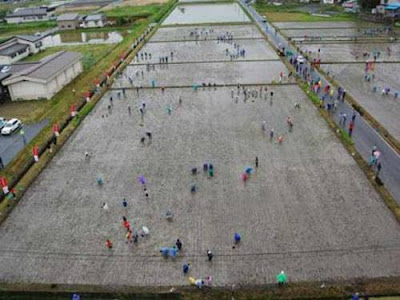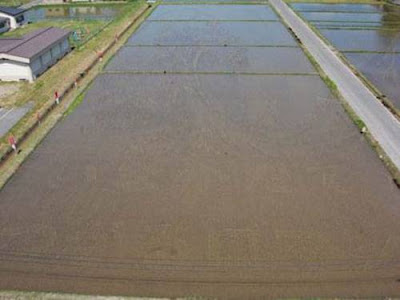Graffiti art is common all around the world these days, and many of those who create it are anxious to retain their anonymity, as indeed Banksy was for such a long time. You may not know of one very distinctive artist called ROA as yet, but as soon as you catch sight of work attributed to this mysterious Belgian street artist, you will be captivated. He has a real passion for animal life, and he spent his youth in Ghent, Belgium. He started off modestly in his artistic beginnings, painting under bridges and onto walls.
Saturday, 12 May 2012
RICE FIELDS OF JAPAN
RICE FIELDS OF JAPAN - Looks ordinary enough...... but watch as the rice grows!!!!!!
Stunning crop art has sprung up across rice fields in Japan , but this is no alien creation. The designs have been cleverly PLANTED!
Farmers creating the huge displays use no ink or dye. Instead, different colour rice plants have been precisely and strategically arranged
and grown in the paddy fields.
As summer progresses and the plants shoot up, the detailed artwork begins to emerge.
A Sengoku warrior on horseback has been created from hundreds of thousands of rice plants.
The colours are created by using different varieties of rice plants, whose leaves grow in certain colours.
This photo was taken in Inakadate , Japan .....
Fictional warrior Naoe Kanetsugu and his wife, Osen, whose lives are featured on the television series 'Tenchijin'
appear in fields in the town of Yonezawa in the Yamagata prefecture ofJapan ....
This year, various artwork has popped up in other rice-farming areas ofJapan , including designs of deer dancers.
Smaller works of 'crop-art' can be seen in other rice-farming areas of Japan such as this image of Doraemon and deer dancers
The farmers create the murals by planting little purple and yellow-leafed Kodaimai rice
along with their local green-leafed Tsugaru, a Roman variety, to create the coloured patterns
in the time between planting and harvesting in September.
The murals in Inakadate cover 15,000 square meters of paddy fields.
From ground level, the designs are invisible, and viewers have to climb the mock castle tower of the village office
to get a glimpse of the work.
Closer to the image, the careful placement of the thousands of rice plants in the paddy fields can be seen.
Rice-paddy art was started there in 1993 as a local revitalization project, an idea that grew from meetings of the village committees.
The different varieties of rice plants grow alongside each other to create the masterpieces.
In the first nine years, the village office workers and local farmers grew a simple design of Mount Iwaki every year.
But their ideas grew more complicated and attracted more attention.
In 2005, agreements between landowners allowed the creation of enormous rice paddy art.
A year later, organizers used computers to precisely plot the planting of four differently colored rice varieties that bring the images to life!
TRULY A WORK OF ART!
Stunning crop art has sprung up across rice fields in Japan , but this is no alien creation. The designs have been cleverly PLANTED!
Farmers creating the huge displays use no ink or dye. Instead, different colour rice plants have been precisely and strategically arranged
and grown in the paddy fields.
As summer progresses and the plants shoot up, the detailed artwork begins to emerge.
A Sengoku warrior on horseback has been created from hundreds of thousands of rice plants.
The colours are created by using different varieties of rice plants, whose leaves grow in certain colours.
This photo was taken in Inakadate , Japan .....
Napoleon on horseback can be seen from the skies. This was created by precision planting
and months of planning by villagers and farmers located in Inkadate ,Japan ....
and months of planning by villagers and farmers located in Inkadate ,Japan ....
Fictional warrior Naoe Kanetsugu and his wife, Osen, whose lives are featured on the television series 'Tenchijin'
appear in fields in the town of Yonezawa in the Yamagata prefecture ofJapan ....
This year, various artwork has popped up in other rice-farming areas ofJapan , including designs of deer dancers.
Smaller works of 'crop-art' can be seen in other rice-farming areas of Japan such as this image of Doraemon and deer dancers
The farmers create the murals by planting little purple and yellow-leafed Kodaimai rice
along with their local green-leafed Tsugaru, a Roman variety, to create the coloured patterns
in the time between planting and harvesting in September.
The murals in Inakadate cover 15,000 square meters of paddy fields.
From ground level, the designs are invisible, and viewers have to climb the mock castle tower of the village office
to get a glimpse of the work.
Rice-paddy art was started there in 1993 as a local revitalization project, an idea that grew from meetings of the village committees.
The different varieties of rice plants grow alongside each other to create the masterpieces.
In the first nine years, the village office workers and local farmers grew a simple design of Mount Iwaki every year.
But their ideas grew more complicated and attracted more attention.
In 2005, agreements between landowners allowed the creation of enormous rice paddy art.
A year later, organizers used computers to precisely plot the planting of four differently colored rice varieties that bring the images to life!
TRULY A WORK OF ART!
A RARE COLLECTION
OLD PHOTOS - A RARE COLLECTION
Mahatma Gandhi at the Railway station in the early 1940s
|
The Sikh parade at the Gateway to India on the occasion of the departure of British Troops from India - 28 February 1948
Mahatma Gandhi with Lord Pethwick Lawrence, British Secretary of State for India - 18 April 1946
Nationalist Indian Muslim leaders after their meeting with the British Cabinet Mission on 16 April 1946
(l to r) Khawaja
Abdul Majil (President of the All-India Muslim Majlis), Mr Zahiruddin
(President of the All-India Momin Conference) and Mr Hisamuddin
(President of the All-India Ahrars)Source:
Indian Prime Minister Jawaharlal Nehru with his grandsons Rajiv and Sanjay Gandhi - 1950
Photographer:Homai VyarawallaSource
- Netaji Subhash Chandra Bose
|
Netaji Subhas Chandra Bose and Adolf Hitler - Germany 29 May 1942
|
A newly elect president
of the Indian National Congress, Subhas Chandra Bose, arrives at
Calcutta's Dum Dum aerodrome after an eventful European tour
Netaji Subhas Chandra Bose with his brother Sudhir Chandra Bose and his wife - 1939
Netaji Subhas Chandra Bose inspects the notorious Cellular Jail on Andaman Island - 1944
Netaji Subash Sandhra Bose with Mahatma Gandhi - 1938
Netaji Subhas Chandra Bose with Heinrich Himmler - 1943
Source: Wikipedia.org
Portrait of Netaji Subhas Chandra Bose - 1936
Beautiful and Creation!
Riomaggiore - Cinque Terre, Italy
Keukenhof Tulip Gardens - Lisse,Holland
Son Doong Cave - Vietnam
Tunnel of Love in Kleven - Ukraine
Terraced Rice Field - Yunnan, China
Salt Desert of Uyuni - Bolivia
Sagano Bamboo Grove - Japan
Pamukkale Travertine Pools - Turkey
Cenotes - Yucatán Peninsula, Mexico
Skogarfoss Waterfall - Iceland
Dunn's River Falls - Jamaica
Capilano Suspension Bridge - Vancouver,
Lucca - ItalyIlhéu da Vila - Portugal
San Marco - Venice, Italy
Thor's Well - Cape Perpetua, Oregon , Usa Maldives
Lake Powell - Utah, Usa
Six Senses Yao Noi - Thailand
Portillo Ski Resort - Chile
Lofoten - Norway
El Escorial, Madrid - Spain Palominito Island - Puerto Rico
Isle of Skye - Scotland
Subscribe to:
Comments (Atom)










































































